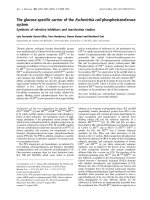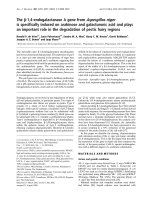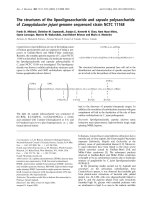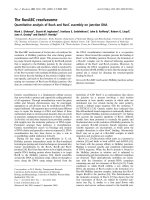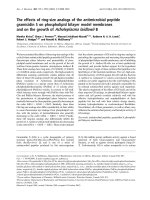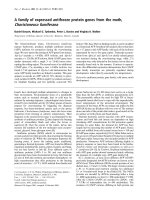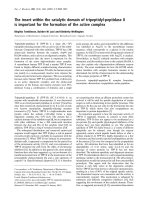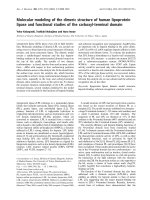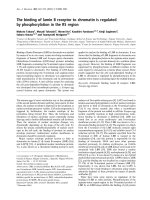Báo cáo y học: "The limitations of observational studies on the treatment of severe sepsis — authors’ response" doc
Bạn đang xem bản rút gọn của tài liệu. Xem và tải ngay bản đầy đủ của tài liệu tại đây (28.47 KB, 1 trang )
548
RCT = randomised, controlled trial.
Critical Care December 2002 Vol 6 No 6 Messori et al.
The observations by Wiederman [1] on our recently
published paper [2] raise some confusion between ‘facts’
and ‘opinions’. In the area of the treatment of sepsis with
antithrombin III, the results of our observational study are
‘facts’ and are therefore a contribution to a better knowledge
of this therapeutic problem. While previous evidence was
based only on randomised, controlled trials (RCTs), our study
has provided some additional evidence using an
observational design. Nobody can deny that having data from
both RCTs and observational studies is better than having
data from only RCTs.
The interpretation of our results (‘opinions’) is another issue.
It is well known that the value of observational studies is a
matter of debate [3–5] and, of course, our study does not
make an exception. We think, however, that one cannot
always restart from the beginning the debate on the
usefulness of observational studies every time one such
study is published.
The same considerations apply to meta-analysis. Detractors
of meta-analysis may argue that there has been a
‘spectacular failure … to predict the outcomes of subsequent
large scale RCTs’. Many other researchers have a different
and more favourable view. In any case, numerous meta-
analyses continue to be published in authoritative journals; in
2001, 152 articles were published in the British Medical
Journal, five articles in the New England Journal of Medicine,
60 articles in the Annals of Internal Medicine, 94 articles in
the Journal of the American Medical Association, and 10
articles in the Lancet (information based on a PubMed
Medline [6] query launched on 11 October 2002 using the
syntax: metaanalysis[titl] OR meta-analysis[titl] OR
‘systematic review’[titl]; limits: ‘only items with abstract’). This
shows that the scientific community recognises the ‘pros’ of
this instrument (even though its ‘cons’ should always be kept
in mind). Also in the case of meta-analysis, one cannot restart
from the beginning the debate about the usefulness of meta-
analysis [7,8] every time an article presents some results of
this type.
In conclusion, we believe that both observational studies and
meta-analytic assessments can be of value in some cases.
The scientific community continues to accept them
regardless of the occasional strong opinions of individual
researchers that dislike these techniques.
Competing interests
None declared.
References
1. Wiedermann CJ: The limitations of observational studies on
the treatment of severe sepsis. Crit Care 2002, 6:546-547.
2. Messori A, Vacca F, Vaiani M, Trippoli S, and the Gruppo di
Studio sull’antitrombina III: Antithrombin III in patients admitted
to intensive care units: a multicenter observational study. Crit
Care 2002, 6:447-451.
3. Pocock SJ, Elbourne DR: Randomized trials of observational
tribulations. N Engl J Med 2000, 342:1907-1909.
4. Benson K, Hartz AJ: A comparison of observational studies
and randomised, controlled trials. N Engl J Med 2000,
342:1878-1886.
5. Concato J, Sha N, Horwitz RI: Randomized, controlled trials,
observational studies, and the hierarchy of research designs.
N Engl J Med 2000, 342:1887-1892.
6. PubMed Medline [ />7. LeLorier J, Gregorier G, Benhaddad A, Lapierre J, Derderian F:
Discrepancies between meta-analyses and subsequent larger
randomised controlled trials. N Engl J Med 1997, 337:536-
542.
8. Various authors: Meta-analyses and large randomized, con-
trolled trials [seven letters]. N Engl J Med 1998, 338:59-62.
Letter
The limitations of observational studies on the treatment of
severe sepsis — authors’ response
Andrea Messori
1
, Franca Vacca
2
, Monica Vaiani
2
and Sabrina Trippoli
2
1
Coordinator, Laboratorio SIFO di Farmacoeconomia, c/o Drug Information Center, Azienda Ospedaliera Careggi, Florence, Italy
2
Researcher, Laboratorio SIFO di Farmacoeconomia, c/o Drug Information Center, Azienda Ospedaliera Careggi, Florence, Italy
Correspondence: Andrea Messori,
Published online: 31 October 2002 Critical Care 2002, 6:548 (DOI 10.1186/cc1841)
This article is online at />© 2002 BioMed Central Ltd (Print ISSN 1364-8535; Online ISSN 1466-609X)
